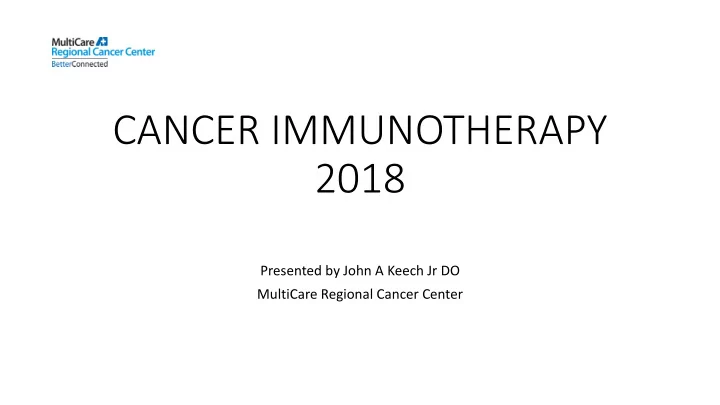

CANCER IMMUNOTHERAPY 2018 Presented by John A Keech Jr DO MultiCare Regional Cancer Center
Successful anti-cancer immunity is autoimmunity Green, The Scientist, 2014
Immunotherapy strategies • Cancer vaccines • Cytokines • Adoptive T cell therapy • Checkpoint inhibitors
FDA approved indications for checkpoint inhibitors Year Agent Target Indication 2011 Ipilimumab CTLA -4 Melanoma 2014 Nivolumab PD-1 Melanoma Pembrolizumab PD-1 2015 Nivolumab PD-1 NSCLC Pembrolizumab PD-1 2015 Nivolumab PD -1 RCC 2015 Nivolumab+ PD-1+ CTLA-4 Melanoma Ipilimumab 2015 Pembrolizumab PD-1 Head Neck SCC 2016 Nivolumab PD-1 Hodgkin lymphoma 2016 Atezolizumab PD-L1 Urothelial cancer 2017 Avelumab PD-L1 Merkel cell carcinoma 2017 Durvalumab PD- L1 Urothelial cancer
Mechanism of action of cancer vaccines Drake (2013) Nat. Rev. Clin. Oncol.
Vaccine toxicities • General – Fever, chills, lethargy • Dermatologic – Maculopapular rash, vitiligo • Gastrointestinal – Diarrhea • Liver – Elevated LFTs • Endocrine – None • Other – Local reactions, back pain, hypotension
Cytokine toxicities • General – Fever, chills, lethargy, flu-like symptoms • Dermatologic – Maculopapular rash, petechial • Gastrointestinal – Diarrhea, nausea, vomiting • Liver – Elevated LFTs • Endocrine – Thyroiditis • Other – CHF, pulmonary edema, hypotension, thrombocytopenia, leukopenia, mental status changes
Adoptive T cell therapy Barrett et al. J Immunol 2015
Adoptive T cell toxicities • General – Fever, chills, lethargy, fatigue • Dermatologic – Maculopapular rash, vitiligo • Gastrointestinal – Diarrhea, colitis • Liver – Elevated LFTs • Endocrine – Thyroiditis • Other – Lymphopenia, CMV, tachycardia, hypotension, oliguria, pulmonary edema, encephalopathy, carditis
CAR-T CELL INFUSION TOXICITY MEDIATED THROUGH CYTOKINE STORM: IL-6 • AT THE PRESENT TIME, ADMINISTRATION IN A MONITORED ICU SETTING • IL-6 INHIBITORS: TOCLIZUMAB AND SARILUMAB
T cell targets for antibody therapy Mellman, Nature (2011)
Checkpoint inhibitor toxicities • General – Fever, chills, lethargy, fatigue • Dermatologic – Maculopapular rash, vitiligo • Gastrointestinal – Diarrhea, colitis • Liver – Elevated LFTs • Endocrine – Thyroiditis • Other – Lymphopenia, CMV, tachycardia, hypotension, oliguria, pulmonary edema, encephalopathy, carditis
Kinetics of immune related adverse events with ipilimumab Weber, JCO 2012
Immune-mediated adverse reactions for nivolumab (n=1994) All Grades n (%) Median time to onset, months (range) Pneumonitis* 61 (3.1%) 3.5 (1 day to 22.3 months) Colitis 58 (2.9%) 5.3 (2 days to 20.9 months) Hepatitis 35 (1.8%) 3.3 (6 days to 9 months) Hypophysitis 12 (0.6%) 4.9 (1.4 months to 11 months) Adrenal insufficiency 20 (1.0%) 4.3 (15 days to 21 months) Hypothyroidism/thyroiditis 171 (9.0%) 2.9 (1 day to 16.6 months) Hyperthyroidism 54 (2.7%) 1.5 (1 day to 14.2 months) Diabetes 17 (0.9%) 4.4 (15 days to 22 months ) Nephritis/renal dysfunction 23 (1.2%) 4.6 (23 days to 12.3 months) Skin* 171 (9.0%) 2.8 (<1 day to 25.8 months) Encephalitis 3 (0.2%) -
Most common adverse events with anti-CTLA-4 and anti-PD-1 Boutros (2016) Nat. Rev. Clin. Oncol .
Infusion Related Reactions • Stop infusion • Give IV: – Diphenhydramine 50 mg – Ranitidine 50 mg • Med choice by symptom: – Fever, chills, headache, diaphoresis • Acetaminophen, ibuprofen or naproxen – Rigors • IV meperidine 50 mg-can be given every 5 minutes times 3 • If does not resolve in 30 minutes or worsens – Consider IV steroids or epinephrine • After symptom resolution, restart infusion at 50% infusion rate
General guidelines • Low grade (1-2) toxicities – Observe – Hold drug – Topical steroids • Medium grade (2-3) toxicities – Hold drug – Oral systemic steroids – Closer monitoring • High grade (3-4) toxicities – Admit – IV steroids • Steroid-refractory toxicities – Other immunosuppressive agents
Management of grade 3 and 4 events Friedman, JAMA Oncology 2016
Management of colitis Adapted from the YERVOY irAR Management Guide
Management of hepatitis Adapted from the YERVOY irAR Management Guide
Friedman, JAMA Oncology 2016
T cells continue to evolve even after drug is cleared • When toxicities occur is variable • Early and late • Prolonged treatment • May need to treat again Responses as late as 106 weeks Weber, Oncologist, 2008
Summary • Prompt recognition of unique immune related toxicities • Grade severity • Toxicities may persist and elaborate even after stopping drug • Consult subspecialty services – Pulmonary, endocrinology, dermatology, GI, etc. • With more FDA indications--very rare side effects • Immune combinations may lead to higher rates of adverse events
Recommend
More recommend